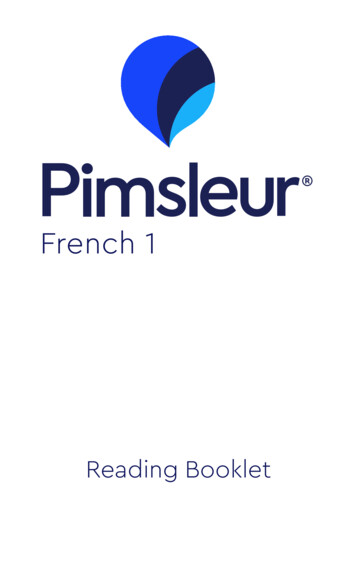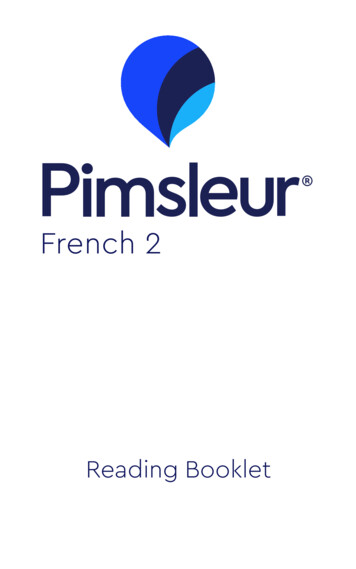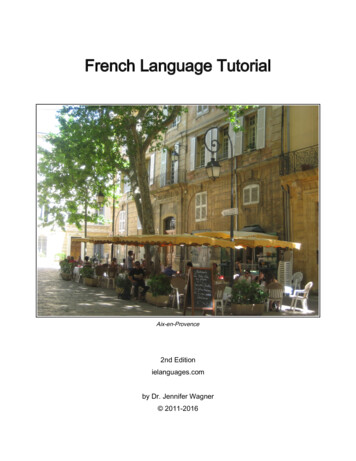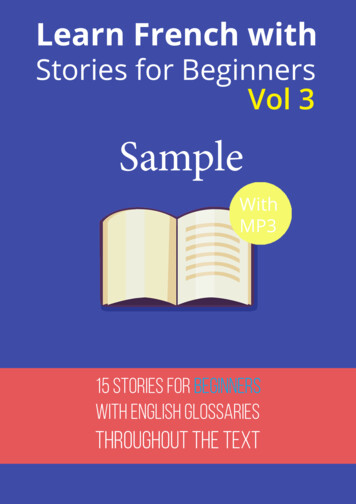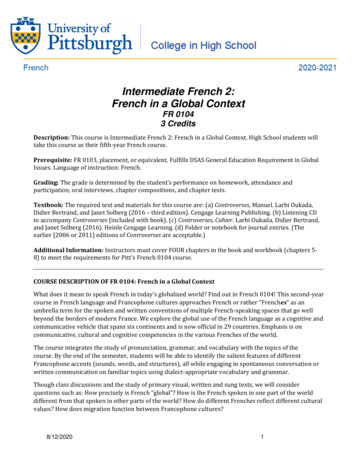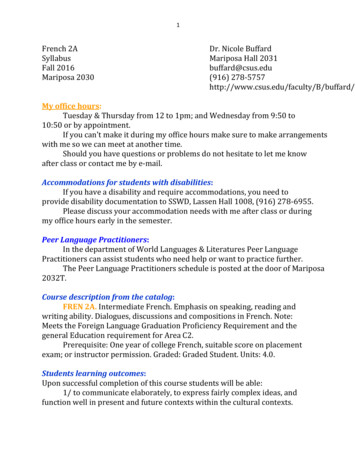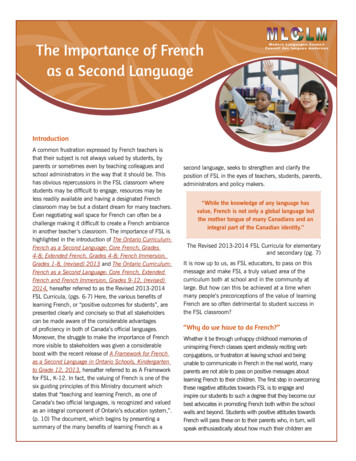
Transcription
D E G R E E SYSTUDINFRANCETESTS AND DEGREESIN FRENCH ASA FOREIGN LANGUAGEFive countries host more than half of the world’s international students:the United States, the United Kingdom, Australia, France and Germany.France hosts 343,400 international students, putting it in fourth placeafter the United States, the United Kingdom, Australia but beforeGermany. International students account for 12% of enrollments inFrench Higher Education.program, and the institutional framework of theproposed program of study in France. Criterion4 deals with the importance of “languageproficiency, with assessment of applicants’proficiency in French, including applicants whoshow exceptional academic potential.”The TCF, administered by theFrench Ministry of Educationand the Ministry of Highereducation, Research andInnovation, is a standardizedtest of general French designedby CIEP (Centre lcenter for pedagogical studies), a certifyingorganization that is a member of ALTE (theAssociation of Language Testers in Europe).The TCF satisfies the quality requirementsof ISO 9001, version 2008, in all of itsprocesses.Several tests of French proficiency anddiplomas in French language are acceptedfor purposes of admission into a Frenchinstitution of Higher EducationThe TCF test of comprehension and thecomputer-based test of written expressionmay be taken on computer in somecountries.FRENCHAN INTERNATIONAL LANGUAGESpoken by 274 million people around the world,French is an official language of 32 states on5 continents. With English and German, it isone of the working languages of the EuropeanUnion, the third-most-common businesslanguage, and the second-most-commonlanguage of news. With 125 million learners ofFrench and 900,000 teachers, it is, after English,the most widely taugh language on the planet.Since 2001, the Council of Europe’s CEFRhas set reference levels for foreign-languageproficiency. The CEFR has become Europe’sstandard for language learning, with 6 levelsof proficiency for purposes of admission toFrench postsecondary institutions.TESTS AND DIPLOMAS IN FRENCHLANGUAGE REQUIRED FOR ADMISSIONTO POSTSECONDARY PROGRAMSThe levels of academic achievement requiredto obtain an extended-stay visa for study inFrance were set forth in an interministerialcircular (from the ministries of the Interior,Foreign affairs, and Higher education andresearch) dated January 27, 2006. The criteriaincluded the candidate’s educational level,the quality of the candidate’s prior academicTCF (Test de connaissancedu français - Test of knowledgeof French) To enroll in the first year of a programin a university (Licence 1) or school ofarchitecture, international students (fromoutside the European Union) must follow theso-called preliminary admission procedure,known as DAP. Applicants must demonstratetheir language proficiency, normally by takingthe TCF-DAP or earning a DELF B2 diploma(or higher). The TEF may be accepted inlieu of the TCF-DAP if the applicant scoredat least 14/20 on the written portion of theTEF. Some universities accept the DUEF(Diplôme universitaire d’études françaises)for admission into the first year of universitystudy (Licence 1). For enrollments in the third year of universitystudy (Licence 2 or 3), in a Master’s program,(Master 1 and 2), in a Doctoral program, or inone of France’s Grandes Écoles, no uniformrequirement applies.Test results are valid for 2 years. Candidateswishing to repeat the TCF or TCF-DAP mustwait 30 days from thedate of their priorsitting. www.ciep.fr/en/tcf-dapEach institution is free to set its own criteriafor French proficiency. Prospective studentsshould inquire about the language requirementsof the institutions of interest to them. Approved TCF centers: entres Study in France: levels required forapplications for preliminary admission (theDAP procedure). A specific version of theTCF (TCF-DAP) is required for applicationsfor preliminary admission (DAP). The TCFDAP includes a mandatory test of writtenFrench. www.ciep.fr/en/tcf-dap Description of the TCF and TCF-DAP:www.ciep.fr/en/tcffeesandlocations: RegistrationCandidates can take the TCF in 712centers approved by CIEP. Centers arelocated in 126 countries, including France.To register, candidates should contact anapproved center for information on testingdates and for the costs of the required andelective components of the test.
LS ANDOOHCS,SRETNCEECIALIZINGUNIVERSITY DEPARTMENTS SPIN FRENCH AS A FOREIGN LANGUAGEA large number of schools and centers (some private, some nonprofit, some university-affiliated) offercourses in French as a foreign language and often other specialized courses, along with language-relatedtourism and travel, language testing, and preparation for language tests and diplomas. Such centers mayor may not be members of a network (Alliances Française, ADCUEFE, the FLE group, Catholic Institutes andinstitutes, Souffle, Unosel). They may or may not have earned national certification for quality in French asa foreign language (the “Qualité FLE” label). And they may or may not have partnerships with universitiesin France and abroad. A ministerial mark of quality: “Qualité FLE ”(quality in French as a foreign language)The “Qualité français langue étrangère” label, often seen as“Q-FLE,” recognizes quality instruction in French as a foreignlanguage. The label emerged from a quality-assuranceprogram undertaken by the French ministries of education,foreign affairs, and culture. It identifies language centers thatstand behind the quality of their courses and services. To date,about a hundred centers have earned the label. Reflecting thediversity of field, the recipients include centers at universitiesand grandes écoles, private language centers, and nonprofitcenters. The label program is managed by CIEP (CentreInternational d’Études Pédagogiques), a public institution that isdescribed further on. www.qualitefle.fr/en Professional groups and networks DCUEFE’s CAMPUS FLE network: the Association of directorsAof university centers for the study of French as a foreignlanguage, brings together 38 university-based centers forFrench as a foreign language that offer courses, certificates,and diplomas in French. Experts representing the ADCUEFEnetwork conduct annual missions to audit curricula and consulton techniques for teaching and learning languages for thebenefit of the French cultural network abroad, French studiesdepartments in foreign universities, schools, educationalsystems, and teachers’ associations.http://campus-fle.fr/en Alliance Française: Founded in 1883, the Alliance Française isa network of 834 Alliances in 132 countries that endeavor tomake French language and culture accessible to all audiences.The Alliance Française de Paris, as well as branches in severalregions of France, welcome students from every country in theworld.www.fondation-alliancefr.org Le français des affaires: For 60 years, the Paris Île-de-Francechamber of commerce and industry has promoted competencein business French through tests and diplomas at all levels andin various sectors of activity. www.lefrancaisdesaffaires.fr/en CIEP, Centre International d’Études Pédagogiques (CIEP):Established in 1945, France’s International Center forPedagogical Studies is a public entity operating under theauthority of the Ministry of Education. Its activities fall intotwo broad categories: education (recognition of degreesand diplomas; educational consulting at all levels, includingprofessional education) and languages (French; languages andmobility; and certifications in French, including the TCF, DELF,and DALF). It is a member of ALTE.www.ciep.fr/en FIPF, Fédération internationale des professeurs de français:FIPF brings together more than 70,000 teachers of French in165 associations, including several national federations. Withvarious partners -including government ministries in France,Canada, and Belgium- FIFP contributes to the internationaldiffusion of French language and culture. Every 4 years, FIPForganizes a world congress for teachers of French and theirinstitutional partners.www.fipf.info Groupement FLE: Founded in 1994, Groupement FLE bringstogether specialists in French as a foreign language from 33different schools. It has created its own quality-assurancesystem based on the quality of the information and servicesoffered to students, the availability of instruction consistentwith the CEFR, and compliance with legal requirements relatedto safety, security and labor law.www.groupement-fle.com/en/learn-french-france SOUFFLE, Groupement professionnel des organismes defrançais langue étrangère: SOUFFLE is made up of 16 Frenchlanguage centers, all of which have earned the “Qualité FLE”label. www.souffle.asso.fr UNOSEL, Union nationale des organisations de séjourséducatifs, linguistiques et des écoles de langues: Founded in1978, UNOSEL is a national federation of 69 language schoolsand organizations active in educational and languagerelatedtravel. Its membership includes 22 schools that offer coursesin French language, culture, civilization and French economy.www.unosel.comGOODTO KNOW ests of and diplomas in French as a foreign languageTenable applicants for Licence and Master’s programs todemonstrate their level of French proficiency. any language schools, branches of the Alliance Française,Mand cultural institutes in France and abroad provide rapidpreparation for tests of French as a foreign language suchas the TCF and TEF. Preparing for the DELF and DALFexaminations requires more structure and greater planningbut guarantees a good command of French. Plus thediplomas are valid for life! tudents who prepare in France for a test of or diploma inSFrench as a foreign language earn higher scores and have agreater likelihood of success because they have the benefitof cultural and linguistic immersion. chieving a level B1 or B2 on the CEFR is desirable forApostsecondarystudy in France.
LE TEF(TEST D’ÉVALUATION DE FRANÇAIS FRENCH ASSESSMENT TEST)TEF (Test d’évaluation de français, Test of FrenchProficiency). Designed and distributed by Lefrançais des affaires de la CCI ParisIle-de-France, the(ESAA)TEF is an internationally recognized instrument forthe assessment of knowledge and skill in the Frenchlanguage. It offers candidates a “linguistic snapshot”of their proficiency in French on a 7-level scale keyedto the Common European Framework of Referencefor Languages (CEFR). Multiple-choice modulestest written comprehension, oral comprehension,vocabulary, and structure. Two open-ended modulestest written and oral expression. The written testsare taken on the computer.Candidates may take the TEF as many times asthey wish, but two months must pass betweensuccessive attempts. Study in France: Application for preliminaryadmission, or DAP (demande d’admissionpréalable), required students enrolling in the firstyear of a Licence program.For purposes of the DAP, the TEF is accepted inlieu of the TCF-DAP (ministerial decree of 25 April2014), provided the applicant passes all requiredparts of the test and earns a score of 325 / 450on the test of written expression, corresponding tolevel B2 of the CEFR and to a grade of 14/20. Therequired score may vary by institution or program.Exemption from the TCF-DAP is valid for a periodof 5 years. About the TEF omas/test-for-evaluating-french-tef/ Registration and fees:The TEF is administered at more than 400approved centers in a hundred countries. Eachcenter sets its own testing schedule and fees.Approved TEF ter/
THE DELF (DIPLÔME D’ÉTUDES ENLANGUE FRANÇAISE - DIPLOMA OFFRENCH LANGUAGE STUDIES)AND DALF (DIPLÔME APPROFONDIDE LANGUE FRANÇAISE - ADVANCEDDIPLOMA IN FRENCH LANGUAGE)The DELF and DALF diplomas, conferred by theFrench Ministry of Education attest to the holder’slevel of proficiency in the French language. Sixdifferent diplomas are offered, corresponding tothe six levels of the CEFR: DELF A1, A2, B1, and B2,and DALF C1 and C2. To earn any of the diplomas,candidates must pass tests in four competencyareas: oral comprehension, oral expression, writtencomprehension, and written expression. Unlike theresults of language tests, which expire after acertain period, the DELF and DALF diplomas arevalid for life. Study in France: levels required for applicationsfor preliminary admission (the DAP procedure)To meet DAP requirements required foradmission to year 1 at a university or school ofarchitecture, applicants must obtain a DELF B2diploma (including DELF General, DELF Student,DELF Junior, and DELF Professional) or a DALFdiploma (C1 or C2). Holders of these diplomas areexempted from any language test that mightotherwise be required for admission to a Frenchuniversity. www.ciep.fr/delfdalf/Note: The level of the diploma required may varyfrom institution to institution and from program toprogram. Description of DELF ormation-the-examinations Description of DALF tests: aminations Candidates must score at least 5/25 on each ofthe four tests. The total score required to obtain aDELF or DALF diploma is 50/100. Registration fees and locationNearly 1,200 DELF examination centers (secondaryschools, language schools, universities, andcultural institutes, including the Alliance Française)operate in 172 active countries. Candidates enrollfor the diploma directly with a center. Coursecosts are set by regional educational authorities(“academies”) in France and, outside France, bythe cultural service of the French embassy. Coststherefore vary by country. Prospective students inFrance or abroad should contact a DELF centerfor more information. France’s National Centerfor Distance Learning (CNED, Centre Nationald’Enseignement à Distance) offers online coursesleading to the DELF B1 through the DALF C2.These online preparatory courses combine selfteaching activities with individual and groupsupport services:www.cned.fr/inscription/8FLESDIX DELF/DALF exam centers: Outside France, directory of xamination-centres-outside-france In France, list of res-fr.pdf Registration and fees. Tests are given in 712approved centers in 126 countries, includingFrance. Contact a center directly for informationon test dates and fees. Approved TCF centers around the testcentresOTHER EVIDENCEOF LANGUAGE PROFICIENCYVarious other credentials (such as the certificate of theAlliance Française and diplomas offered by CCIP andvarious universities) are recognized and accepted byinstitutions. International students must verify that aparticular credential is recognized by the institutions towhich they intend to apply.The credentials conferred by the Alliance Française,which operates in France and abroad, are recognizedin Europe by ALTE (Association of Language Testers inEurope). The DHEF (Diplôme de hautes études françaises,diploma of advanced study in French) corresponds tolevel C2 of the CEFR. www.alliancefr.org/enDiploma courses in professional French are designed toenhance your ability to work in French from level A1 tolevel C1.Developed by Europe’s leading chamber of commerceand industry, these diplomas in professional French allowyou to stand out in the employment market and get thejob you want.
Advantages: A permanent credential recognized by employers, Computer-based tests based on real situationsencountered in the real world, Fast access to test results: 3 weeks, A virtual course: accessible 24/7 in your secure digitalspace!For more information: iness-french-diplomas-dfp/University programs: International students who havechosen a language program in a university-based centerfor French as a foreign language may establish their levelof proficiency with a DUEF B2, C1, or C2 for admissioninto L1. Postsecondary diploma programs (DUEF, diplômed’université d’études françaises) offered by individualuniversities recognize various levels of French proficiencyconsistent with Common European Framework ofReference for Languages (A1, A2, B1, B2, C1, C2). Thesediploma programs, developed and harmonized byADCUEFE’s Campus FLE network of university centers forFrench as a foreign language, specify the level reached bythe end of the program. They include instruction explicitlydesigned for students intending to begin a program ofacademic study in France.The DUEF B2, DUEF C1, and DUEF C2 credentials signifyattainment of the level of proficiency required to enter alicence or master’s program.Note: DUs are institution-specific credentials. Theyare not national diplomas, which are regulated by theFrench government and recognized throughout France.International students should inquire about the cost ofDU programs of interest and ensure that the institution inwhich they wish to enroll upon completion of their DUEFprogram will recognize the credential.ASSESSMENT OF FRENCH PROFICIENCY FOR NON-FRENCH-SPEAKERSREFERENCE LEVELS FOR REQUIRED TESTSCECRLCouncil of EuropeDELF - DALFValid for lifeTCFResults validfor 2 yearsC2DELF C2AdvancedproficientC1DELF C1ProficientB2DELF B2AdvancedIntermediateB1DELF B1IntermediateA2DELF A2AdvancedBeginnerA1DELF vel 6600 - 699Level 5500 - 599Level 4400 - 499Level 3300 - 399Level 2200 - 299Level 1100 - 199TEFRecommended validityof results: 1 mmandCommandof basicstructuresBasicknowledgeLevel 6834 - 900Level 5699 - 833Level 4541 - 698Level 3361 - 540Level 2204 - 360Requiredhours of study(approximate)Varies700 h - 900 h500 h - 690 h330 h - 550 h180 h - 300 hLevel 169 - 2030 0 - 6880 h - 150 hSource: MEAE-DGM,; CIEP; CCIP Exemptions from requirements to demonstrate proficiency in frenchApplicants who meet one of the following criteria may be exempted from the requirement that they demonstrate their proficiency inFrench: Holders of the French baccalauréat (conferred by the Ministry of Education); the European baccalaureate; and three binationalbaccalaureates (Abibac-Abitur, France-Germany; Bachibac, France-Spain; and Esabac, France-Italy) may be exempted from the TCFDAP requirement ; Nationals of states where French is the official language: Benin, Burkina Faso, Democratic Republic of Congo, Côte d’Ivoire, Gabon,Guinea, Mali, Monaco, Niger, Republic of Congo, Senegal, and Togo; Nationals of multilingual states where French is one of the official languages: Belgique, Burundi, Cameroon, Canada, Central AfricanRepublic, Chad, Comoros Islands, Djibouti, Guinée équatoriale, Haiti, Luxembourg, Madagascar, Seychelles, Switzerland, and Vanuatu.In order to be excused from taking the TCF-DAP, applicants must have completed their secondary education in a French-languageinstitution; Students graduating from bilingual programs in which French was one of the languages; Nationals of states in which final examinations for graduation from secondary school are conducted primarily in French; Applicants participating in a program governed by an intergovernmental accord or interuniversity agreement; International recipients of scholarships from the French government, international organizations, or foreign governments whosegrants are administered by an approved French entity; Stateless, refugees, children of diplomats serving in France; In some cases, students enrolling in programs taught entirely in English:http://taughtie.campusfrance.org
USEFULL IN K SONLINE CATALOG AND MOBILEAPPCatalog of short academic programsand programs in French language and culturehttp://ecolesdete.campusfrance.orgPresented in French and English, the catalog providesinformation on programs in French as a foreign language andon summer and winter academic courses in France.Features include: An interactive map of France’s regions; Searches by French-proficiency requirements and field ofstudy; More than 300 recreational, cultural, and food-relatedactivities.Immersion France, is a mobile app developed by CampusFrance in partnership with France’s Ministry of Europe andForeign Affairs for students exploring options for tourism andlanguage learning in France. Features include: Detailed program descriptions; Presentations of France’s regions; Contact information.LEARN MOREABOUT FRENCH DEGREESIN THE RESOURCES CENTER.ResourcesCenterwww.campusfrance.org Resources center Educational and research programs Degree descriptionsOctober 2018 ADCUEFE, the association of directors of university centers for thestudy of French as a foreign language for foreigners – CAMPUS FLEnetwork: http://campus-fle.fr Agence de promotion du FLE:www.groupement-fle.com/en/learn-french-france ALTE, The Association of Language Testers in Europe:www.alte.org Arrêté du 3 mai 2007 (test d’évaluation du français (TEF):www.fda.ccip.fr/documents/pdf/tef/arrete men 2007.pdf Asdifle, Association de Didactique du Français Langue Étrangère(Association for the teaching of French as a foreign language):www.asdifle.org AUF, Agence Universitaire de la Francophonie (Francophone universitiesagency): www.auf.org CCIP, Paris Île de France Chamber of Commerce and Industry:www.cci-paris-idf.fr CEFR, Common European Framework of Reference for Languages ofthe Council of Europe: www.coe.int/en/web/language-policy/home CIEP, Centre International d’Études Pédagogiques (International centerfor pedagogical research): www.ciep.fr/en CNED, Centre National d’Enseignement à Distance (National center fordistance ionnelle/fle/ Europass (Niveaux européens de langues de la CommissionEuropéenne - Grille pa.eu/fr/resources/european-language-levels-cefr FIPF, Fédération internationale des professeurs de français(international federation of teachers of French): www.fipf.info Fondation Alliance française, the network of Alliance Françaisebranches around the world: www.fondation-alliancefr.org Franc-Parler, web portal of the global community of teachers of French:www.francparler-oif.org GERFLINT, Groupe d’études et de recherches pour le français langueinternationale (research group for French as an international language):www.gerflint.fr HERACLES (Hautes études et recherches pour les centres de languesde l’enseignement supérieur, advanced study and research to supportpostsecondary language centers) world forum:www.forummondialheracles.wix.com/heracles Learn French in France:http://ecolesdete.campusfrance.org Le Français dans le monde, review published by FIPF: www.fdlm.org OIF, Organisation Internationale de la Francophonie (Internationalfrancophone organization): www.francophonie.org Organization for the promotion of French as a foreign language:www.fle.fr RFI, Radio France internationale: http://en.rfi.fr T raining centers in France that have earned the FLE quality label:www.qualitefle.fr/en TV5 Monde, Apprendre le ons-francais.tv5monde.comEnseigner le français (Teach French with TV5 monde)http://enseigner.tv5monde.com
French and 900,000 teachers, it is, after English, the most widely taugh language on the planet. Since 2001, the Council of Europe's CEFR has set reference levels for foreign-language proficiency. The CEFR has become Europe's standard for language learning, with 6 levels of proficiency for purposes of admission to

